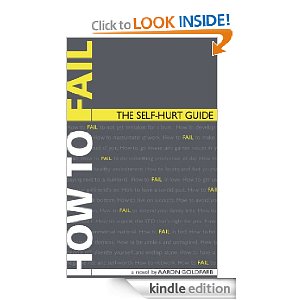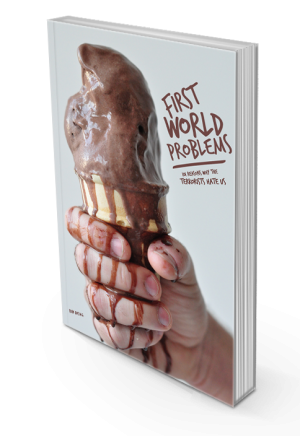Writing a book is hard. Publishing is easy. Marketing is hard.
“What now?” is a question a lot of self-published authors are going to ask themselves once they finish their book. It’s a question I’ve been asking myself now that I published a book.
While I don’t have much advice from experience on book marketing, Aaron Goldfab does.
Aaron Goldfarb is smart. If you read his book, How To Fail, you’ll know he’s funny, but it took a smart person to write that book.
What great entrepreneurs often do is look at what everyone else is doing in a market and then do the opposite.
So with the market for self-help books saturated, Aaron wrote a self-hurt book. Brilliant.
Who better to have a discussion with on marketing a book than someone who has successfully done it? His book wasn’t self-published, but the advice he has is relevant for anyone who published a book.
Below is a conversation we’ve been having through email on book marketing.
———————————————————————————————-
(Ben) What are your thoughts on pricing?
I think I’ve seen your book range from $9.99 to .99 cents. I’ve read about the sweet spot with pricing being $2.99, but I’m not sure if that’s a good starting point or not.
Seth Godin thinks you should start at free and work up to $14.99 (read)
Kevin Kelly thinks books will end up at 99 cents (read)
(Aaron) RE: Thoughts on Pricing
The “How to Fail” ebook was released at $9.99 (the paperback was likewise $14.99). It was selling miserably at that price even though I was selling 1000s of paperback copies per month. I was savvy enough to never sign away the ebook rights to my publisher, so after a few months I decided to start messing around with pricing. It’s odd, I NEVER buy ebooks priced as high as $9.99, yet I was arrogant enough to price my own that high initially. I still haven’t learned everything about pricing, but in the future I think (somewhat opposite to Seth’s strategy), that I would start my ebooks (assuming I have full ownership) in the $4.99-$7.99 range depending on the product, get it down to $2.99 eventually, with occasionally “sales” in the in the $0.00-$0.99 range.
Speaking of Seth…I was having some legal issues with my publisher back in January and they were unscrupulously withholding royalties from me. Thus, it almost felt futile to be doing marketing and trying to sell books I might not ever earn money on. I happened to run into Seth, explained my situation, and asked what I should do. He told me not to worry about earning the money, and at this point in my career to simply worry about building my tribe. That was a liberating statement. Pricing of books no longer became a concern to me–my only concern was getting my book into as many people’s hands as possible, and then hoping they would read it and enjoy it. And crave my next book which I could earn a lot of money on.
So the question is…is it worth pricing your book so high that potential readers are turned off?
(Me)Is there a reason to ever sign with a publisher?
For people like Adam Carolla or Gary Vaynerchuk, who have big built-in fan bases, it seems strange that they would work with a publisher, especially Carolla (Listen to this clip). Though, I think Gary Vaynerhcuk has said in an interview that he can opt-out of his contract at any time and might for his next book.But they have audiences already. What about the no name author who has a great book that catches the eye of an editor at a big publishing house? Should they sign and give up control or do it themselves?
James Altucher’s response when I asked him this question (read)
Recent ranting about publishers from Sebastian Marshall from working with Simon & Schuster (read)
(Aaron) RE: Is there a Reason to Ever Sign With a Publisher?
I agree with Altucher that advances are one of the only reasons–but, of course, they suck now. If I was Chad Harbach I wouldn’t be saying that though.
I agree with Carolla that not only do the publishing companies not want to do any work for you–but they have the gall to try and prevent you from doing work that benefits you both!And if you have a massive built-in fan base, I’m not sure why you wouldn’t self-publish. Why you wouldn’t do what Louis CK just did with his comedy show. (Then again, you have to be willing to go from “author” to “entrepreneur” and take over–or pay your own money for–all sorts of other tasks that had been handled for you in the past: cover and interior design, ebook conversion, marketing, advertising, publicity, etc.)
Having said that, I write novels, and novels can be harder to sell self-published than non-fiction books which are often based on ideas people have an easier time subscribing to. Novels sometimes need that boost of front table placement and what not.
My main advice would be to avoid the “middle.” Either self-publish and have total control or do the complete other extreme and hit a home run big advance from a Big Six publishing house and not give a damn if they screw you over. Being in the middle though, with a lame advance, a lame publisher, a book that isn’t marketed well, AND you have no control?
Fuck that.
(Ben) Is there any hope for book publishers?
The quotes from publishers on one of your blog posts are absurd, but unfortunately believable (read).
(Aaron) RE: Is there any hope for book publishers?
Sure. Publish great books. Give better royalty rates. Be more willing to work with authors and listen to their ideas. Be more willing to act like modern businesses than ones stuck in the 1920s. Be my teammate, not my adversary.
(Ben) How Do You Get Reviews?
You do something funny and brilliant at the end of your book, How To Fail, with encouraging people to write a review on Amazon. Beyond that, do you have any strategies or tactics for getting people to leave a review on Amazon? Is it fairly easy to get people who enjoyed your book to leave a review or do they almost have to be at gun point?
(Aaron) RE: Reviews
Gun point. I think there’s a certain type of internet weirdo that HAS to write a review about literally everything they consume, from books to films to restaurants. These are probably the same people that check-into their own house on Foursquare (“I just checked in at HugeNerd HQ!”) You know the types. Anecdotally, by my math, and who knows if I’m right, 20% of book purchasers actually read the book (or read MY book), and less than 1% of them leave a review on Amazon. Even with your best friends, you’ll almost have to drag them over to a laptop and place their hands on the keyboard to get them to write a review. No one wants their entertainment consumption to turn into a fucking homework assignment.
(Ben) Marketing / Advertising Strategies?
From an outsiders persective, it looks like you’ve done: interviews, blogging, tweeting, and a book tour. Have you experimented with anything else? (PPC ads, Paid reviews: http://www.kirkusreviews.com, Giving away free books/chapters, etc.) What was most effective? And what will you do differently with your next book?
(Aaron) RE: Marketing / Advertising
Giving away content is always effective…at giving away content. But I’ve yet to determine whether you become like the guy on the street corner shoving fliers into people’s hands which they discard in the trash can on the next block. Ebooks are of course even “cheaper” than 1 cent Xeroxed fliers so personally I don’t care if 99% of my content gets discarded at the end of the next block–I still think it’s a good strategy for getting some people to read you. To use another street corner analogy: the first taste of crack is free. Your crack better be damn good though.
(Ben) What do you think the book market will look like in the next 3-5 years?
Again, to quote Seth Godin “When anyone can publish a book, anyone will.” Will a book become the new resume? Will it be the default way for people to monetize their blogs? Will Sturgeon’s Law (90% of everything is crap) apply to eBooks, if it doesn’t already? Will everyone be trying to write Kindle Singles instead of long-form books?
(Aaron) RE: What do you think the book market will look like in the next 3-5 years?
I think “anyone will” who actually has ever had any sort of ambition about writing a book. But still, writing 400 pages–or even 100 pages–even mediocre pages, is still some bit of work. Still too much work for 99% of the population. Books are already becoming shorter and quicker reads, more blog-like. I think they’ll eventually become more multimedia too. I would say long-form novels and massive non-fiction books will start becoming ultra-niche, like opera or the ballet, but then again, the best-selling book of this year is a door-stop size bio on Steve Jobs. So maybe not.
And it’s not 90% of everything that is crap. From my viewpoint, it’s 99.9%
Aaron Goldfarb is the author of How To Fail: The Self Hurt Guide. Check it out on Amazon below.

Connect with me on Twitter and read my book.

Thanks for this. I’ve just started down this road myself and it’s overwhelming. I agree. I think nearly everything out there is crap. Finding the diamond in the rough becomes nearly impossible.
Outstanding advice and insight. I love the honest feedback and various links. We’re exploring how to get our books to a wider audience and your ideas and suggestions, as well as what not to waste our time on is extremely useful. I’ll be spending the weekend following all your links and building out a marketing plan to keep up the promotion.
Very helpful, and fucking funny. Thanks
On the issue of reviews I would suggest that one spares a little amount of cash and hire the services of a review services provider like http://www.bestessayservices.com. This would save you a lot of time and cash. You do not have to hire the expensive service providers while you can get a professional to do it for you at reasonable charges.
I’d highly recommend NOT paying for reviews, but thanks for commenting anyway.
Very valuable information here from Ben.
I also had a press release done from these guys: http://www.pieceofcakepr.com/lp2
Was pretty cool.